
What have been the major developments- related to artillery systems over the last decade?
In the past decade a lot of artillery, but still not all of them, have shifted from 155 mm 39 Cal to 155 mm 52 Cal. This is the most important development. A lot of artilleries have also shifted- or started to shift from soviet standards like 152 mm to NATO standards 155 mm.
Shifting from 39 Cal to 52 Cal is not menial. The internal pressures are much higher. In that respect, Nexter analyzed that, and conducted specific developments in its breech and other features which have proven very wise. Before you have tested your 52 cal with many high charges fire missions, without mishaps, and particularly security mishaps, you don’t know if the biggest threat to your gun will be your own fire mission instead of the enemy. Usually, qualification missions involve a few hundreds of rounds, but in CAESAR’s case thousands of rounds at high charges in real operations have confirmed the trials
Before the last decade of course, the major revolution in artillery is the availability of navigation units and GNSS systems. And simultaneously IT systems have allowed to compute complex artillery fire missions in a short time. Modern artillery C2 systems have been another major revolution.
How are customer preferences for artillery systems expected to evolve over the course of this decade?
The major requirement requested by a lot of customers is an increased range.
Esta historia es de la edición September 2022 de Geopolitics.
Comience su prueba gratuita de Magzter GOLD de 7 días para acceder a miles de historias premium seleccionadas y a más de 9,000 revistas y periódicos.
Ya eres suscriptor ? Conectar
Esta historia es de la edición September 2022 de Geopolitics.
Comience su prueba gratuita de Magzter GOLD de 7 días para acceder a miles de historias premium seleccionadas y a más de 9,000 revistas y periódicos.
Ya eres suscriptor? Conectar
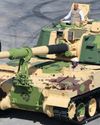
OVING M TARGET
India's evolving battlefield strategies emphasise the need for the Indian Army to accelerate the induction of Self-Propelled Howitzers, enhancing firepower, survivability, and precision, as highlighted by ATUL CHANDRA, driven by lessons from global conflicts and emerging technological advancements

INDIAN ARMY EMBRACES "SMART SOLDIER" FUTURE
JOSEPH P CHACKO examines the SMART Soldier initiative's historical context, current developments, and prospective aspirations, exploring its past, present, and future

REMINISCENCES OF THE 1971 INDO-PAK WAR
In the ancient world, the concept as it emerged during the BCE period wasn't about soldier-scholars. It is probable that it may have started off as the discipline of scholar-soldiers; a huge difference for the discerning. This is because soldier-scholar suggests military dominance in the development of warfighting norms and modalities. This dominance gets marginalised when the hyphenation is reversed and becomes scholar-soldier. It opens itself to introducing the civilian scholar who understood war and warfighting well enough to understand its nitty-gritty, perhaps even suggest how it could be conceptualised, planned, fought, and ended.

ADVANCING BALLISTIC PROTECTION AND AMMUNITION
SMPP, with a rich legacy in ballistic protection and ammunition components, continues to innovate in defence manufacturing. ASHISH KANSAL, Director SMPP, shares insights into the company's expansion into ammunition production, its ground breaking advancements in lightweight ballistic materials like Boron Carbide, R&D plans for precision-guided munitions, and ongoing collaborations for global defence opportunities, highlighting their contributions to both domestic and international markets.
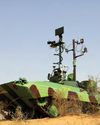
THE RISE OF UGVs REVOLUTIONISING TACTICAL AND STRATEGIC MILITARY OPERATIONS
MANOJ K CHANNAN explains the history of UGVs, their role in modern warfare, their integration with advanced technologies, and their broader implications for military operations, intelligence assessments, and human-machine collaboration

INNOVATIONS AND ADVANCEMENTS IN DEFENCE TECHNOLOGY BY MKU
The defence industry is evolving rapidly to address the dynamic challenges of modern warfare, and MKU is at the forefront of this transformation. In an exclusive interaction, VAIBHAV GUPTA, Director India Business of MKU highlights their innovative approaches, spanning advanced ballistic protection, cutting-edge night vision and thermal imaging technologies, and strategic partnerships to enhance India's defence capabilities. From pioneering protective solutions for soldiers to leveraging indigenous technological breakthroughs, MKU continues to redefine the benchmarks of excellence in defence technology.
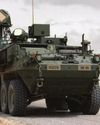
INDIA'S STRYKER CHOICE
India's selection of the US-made Stryker armored vehicle over the indigenous WhAP sparks debates on prioritiSing swift acquisitions and combat readiness versus commitment to self-
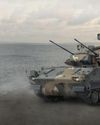
HANWHA AEROSPACE DEEPENS INDIA DEFENSE TIES AMID REGIONAL TECH RACE
Amid growing regional competition in defence technology, a prominent defence initiative is strengthening ties with India through successful artillery and air defence programs. This collaboration aligns with India's strategic focus on bolstering domestic defence manufacturing and reducing reliance on imports. By fostering advanced technology transfer and enhancing local production capabilities, the partnership is poised to transform the defence landscape in Asia, showcasing significant achievements in artillery systems, air defence solutions, and aerospace innovation

ADVANCING INDIA'S DEFENCE CAPABILITIES
Larsen & Toubro (L&T) is advancing India’s defence ecosystem with ground breaking innovations, including next-generation combat platforms, autonomous technologies, and cutting-edge systems, underscoring its commitment to India’s military modernisation, highlights ARUN RAMCHANDANI, SVP & Head – L&T Precision Engineering and Systems IC
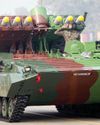
NEED FOR A LARGER ARTILLERY FORCE
At a time when India is increasingly facing a multi-front challenge on her borders, it is quite evident that the Indian artillery modernisation programme needs a massive thrust from the government, argues JYOTI SINGH